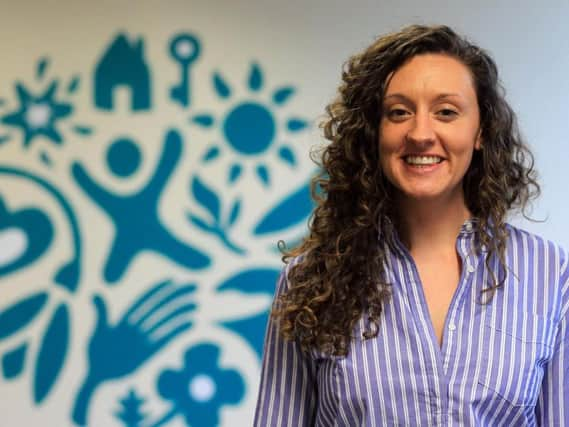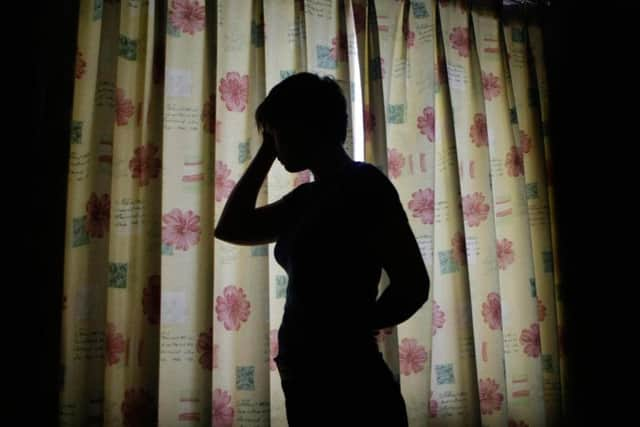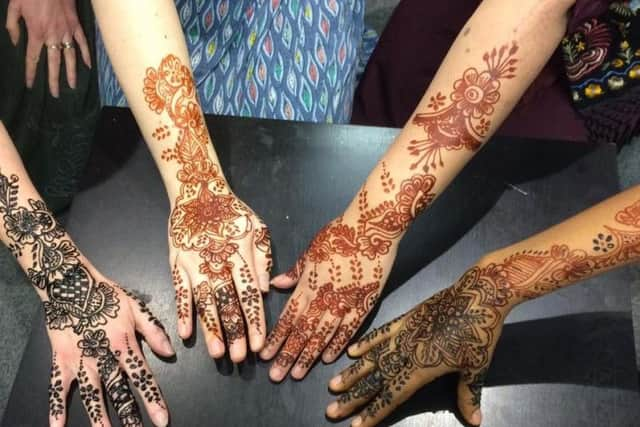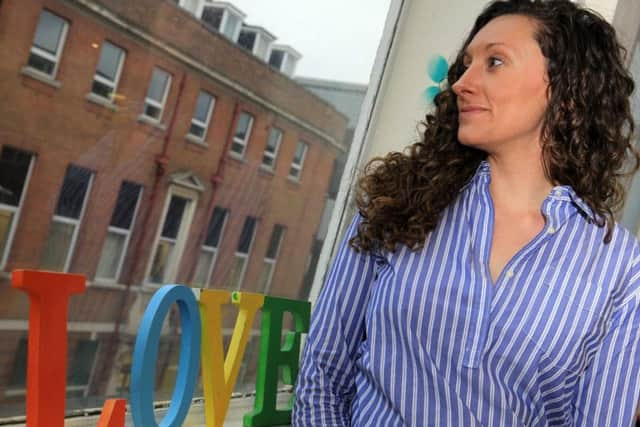The Sheffield charity helping modern slavery victims rebuild shattered lives


That's according to a woman who has seen first-hand the trauma experienced by those forced into a life of crime, prostitution or unpaid labour in the UK.
Lara Bundock was so horrified by the stories she heard from human trafficking victims that she risked her livelihood to give them what she describes as 'the chance to live the life they want'.


Advertisement
Hide AdAdvertisement
Hide AdShe is chief executive of the Snowdrop Project, in Sheffield - the first UK charity dedicated to helping those rescued from servitude rebuild their shattered lives after leaving the Government's safe houses.
It was her time as a social worker in one of those safe houses - the initial place of refuge for freed trafficking victims - which convinced her a new approach was needed.
That led to her sacrificing her salary and scraping a living as she worked out of a spare room for years, but it is a decision she doesn't regret for one minute.
"The work in the safe houses was fantastic but once their time there was up, which could be after as few as 45 days, there was nothing to support their transition into the community.


Advertisement
Hide AdAdvertisement
Hide Ad"I saw women who were doing OK when they left and a few weeks later I would get a phone call to say they're falling apart.
"Some weren't paying their bills because they didn't understand about money management, some were struggling with alcohol and drug addiction or psychotic episodes and others went missing or became homeless.
"We had people coming back to us saying 'please help' and the regulations meant we couldn't because their time in the safe house was up. It was really frustrating.
"That's when I had the idea for a training programme to enable people to provide long-term support to trafficking victims."


Advertisement
Hide AdAdvertisement
Hide AdThe Snowdrop Project began life in May 2012 as a voluntary initiative set up by Lara, Rachel Medina and Tim Elverston.
They developed an eight-week training course to help volunteers understand the difficulties facing trafficking victims and how best to empower them to get back on their feet, and in October that year Snowdrop accepted its first referrals.
Initially Lara juggled her social work at the safe house with the new venture, but eventually she reached ‘breaking point’ and realised she had to commit full-time to Snowdrop.
She and Rachel worked for two-and-a-half years without a salary, relying on their belief in the mission and the generosity of their myriad supporters, including strangers who gave up their spare room free of charge, to keep going.


Advertisement
Hide AdAdvertisement
Hide AdA big breakthrough came last spring with the award of more than £400,000 from the Big Lottery Fund enabling them to expand from no paid staff to nine in one fell swoop as they rapidly ramped up the scale of the operation.
What began as a social care service now encompasses everything from dancing and sewing classes to English lessons, a mums-and-toddlers group and a befriending scheme, helping victims adjust to their newfound freedom and settle into the community.
One of the simplest but most important services they offer is home renovation, in which a team of volunteers will turn up and ‘blitz’ the client’s new pad, a la Changing Rooms.
The aim is to turn what can be a cold, soulless box – often dirty and usually unfurnished – into a warm environment people are proud to call home.
Advertisement
Hide AdAdvertisement
Hide AdIt is hard to overestimate the difference even the most basic makeover can make to people’s wellbeing, stresses Lara.
“They’re often placed in homes with no carpets and sometimes with peeling walls covered in black mould,” she says.


“They’re not places you would want to move into and because our clients are usually quite socially isolated and have little or no income they’re not able to do them up.
“One of the major factors we found pushed people back into problems was moving into a place with no home comforts which just feels like a cold box. Being able to change that has a huge impact.”
Advertisement
Hide AdAdvertisement
Hide AdSnowdrop’s goal, says Lara, is to help everyone feel secure and move on – a long-term project which can take anywhere from a few months to several years.
Many victims arrive still fearing for their lives, and not knowing who to trust, and the first task is often simply to make them feel at ease.
The charity's Carver Street HQ in the city centre looks like a typical office from the outside, but inside it is very different. Warm colours and soft lighting, coupled with comfy chairs and cushions - not to mention the toys piled up in the corner - all help create a relaxed environment, where people can feel at home.
Boxes of tissues scattered liberally around the place offer the only hint of the trauma endured by those who have broken free of their oppressors.
Advertisement
Hide AdAdvertisement
Hide AdSnowdrop has helped around 60 slavery victims rebuild their lives over the last five years. Many have gone on to find work or start college, but perhaps the greatest testament to its success are those who chose to remain with the charity as volunteers to help others like them.
For Lara, the saddest thing is how some trafficking victims will go back to selling their bodies or committing crime once freed because it’s the only life they’ve ever known.
"One woman said if I wasn’t supported by you I would have gone back into prostitution, not because I want to but because I didn’t know anything else," she said.
"She said our support showed her there were people who believed her life could be different and because of that she kept going.
Advertisement
Hide AdAdvertisement
Hide Ad"Everybody deserves a chance to live the life they want to rather than having someone else controlling and dictating their life.
"One woman we supported had been held as a domestic servant for years and when she came to us two Christmases ago she spoke no English, was destitute and was about to be made homeless.
"She now has a house, speaks English and is applying for a job. She was also able to get compensation for how she was treated and had the family jewellery which was stolen from her returned."
When asked about her greatest inspiration, Lara doesn't pause to think and it's not the usual global leaders she plumps for.
Advertisement
Hide AdAdvertisement
Hide Ad“It’s our clients. You hear their stories and you think it’s incredible they’ve been through all that and they’re here saying they want to try to achieve this or that," she says.
“To have the strength to give evidence against their traffickers or to have only known sexual exploitation but to believe you can do something different. It’s seeing that which I find really inspiring and which keeps a lot of us here going.”
"People imagine the victims will be really weak but what we’ve discovered is they have a huge amount of resilience."
Human trafficking is where people are recruited and moved to another location on the promise of a job or better life, which fails to materialise.
Advertisement
Hide AdAdvertisement
Hide AdThey are exploited for various means and are controlled through emotional, physical and sexual abuse, often being locked up, having their ID confiscated and being threatened with violence against them or their families.
Between 11,000 and 13,000 people are estimated to be caught in trafficking in the UK, with those victims coming predominantly from Albania, Vietnam, Nigeria, Romania and the UK itself.
In 2015, 3,266 trafficking victims were rescued in this country. The majority had been ensnared in sexual exploitation or slave labour, but those numbers included five people whose captors wanted to harvest their organs.
South Yorkshire Police last year recorded 75 cases of human trafficking and referred 44 suspected victims for support.
Advertisement
Hide AdAdvertisement
Hide AdThere are a lot of myths about human trafficking, says Lara, and one of the biggest is that it’s only propping up the sex trade.
Although trafficking victims are often forced to work in brothels, many cannabis factories, car washes and discount shops also rely on slave labour, she explains, though the latter two are often perfectly legitimate businesses.
Another big misconception is that human trafficking victims all come from abroad and it doesn’t happen within the UK.
“Trafficking is any movement for exploitation, and it doesn’t have to be across an international border. It could be from Sheffield to Barnsley,” she says.
Advertisement
Hide AdAdvertisement
Hide Ad“Children, homeless people and those with learning difficulties are often targeted because they’re the most vulnerable.
“Traffickers are looking for anyone who’s already vulnerable, because the traffickers want to get them away from anyone who might be looking out for them.”
Human trafficking victims are generally placed far from where they were rescued to prevent them falling back into the clutches of their tormentors.
That means Lara and her team meet few trafficking survivors from Sheffield. But she has no doubts there are people being exploited in the city, and she believes everyone has a responsibility to look out for those affected.
Advertisement
Hide AdAdvertisement
Hide Ad“It’s about picking up on anything that feels odd. If something tells you that’s just not right, it’s probably worth a phone call," she said.
As the first charity in the UK to address the need for long-term support for modern slavery victims, Snowdrop has blazed a trail which has sparked interest from groups across the UK keen to copy its success.
The charity has been shortlisted in two categories of this year's Yorkshire Choice Awards: best charitable business and best businesswoman, for Lara.
Along with its nine staff, several of whom are part-time, it relies on a team of around 30 active volunteers for help with everything from casework to organising community activities.
Advertisement
Hide AdAdvertisement
Hide AdFor more information about volunteering or fundraising for Snowdrop, visit www.snowdropproject.co.uk.
CASE STUDY
Michelle (not her real name) was born in Africa, where both her parents were killed when she was just 12 years old.
With no one to look after her, she lived on the streets for two years until she was 'befriended' by a man in his early 20s who offered to support her if she came to live with him.
Over the next 15 years, she was trafficked across three continents and exploited for both sexual and criminal ends. She was held at gun point, beaten by those controlling her and survived unimaginable horrors.
Advertisement
Hide AdAdvertisement
Hide AdShe eventually escaped in the UK and came to Snowdrop in 2015 after leaving a government safe house.
She was suffering from post-traumatic stress, bore the physical wounds of her torture and was so mentally scarred she was afraid to trust anyone.
Over the next year, Snowdrop helped her overcome legal issues and learn to live independently for the first time. She received counselling, learned how to access healthcare and immersed herself in community activities.
Last year, she moved to another city and realised her dream of starting college, where she is flourishing.
Michelle, who remains in touch with the charity, said: "My caseworker has helped me a lot... she really, really, really helped me. Without her I would be nothing."